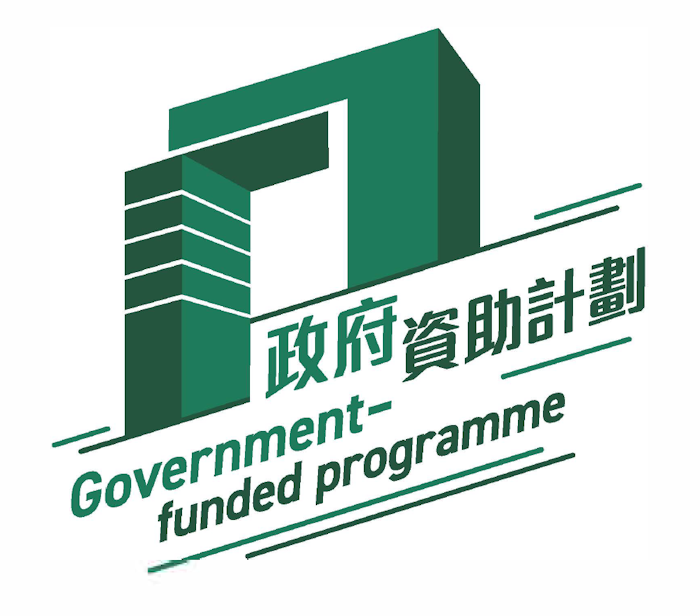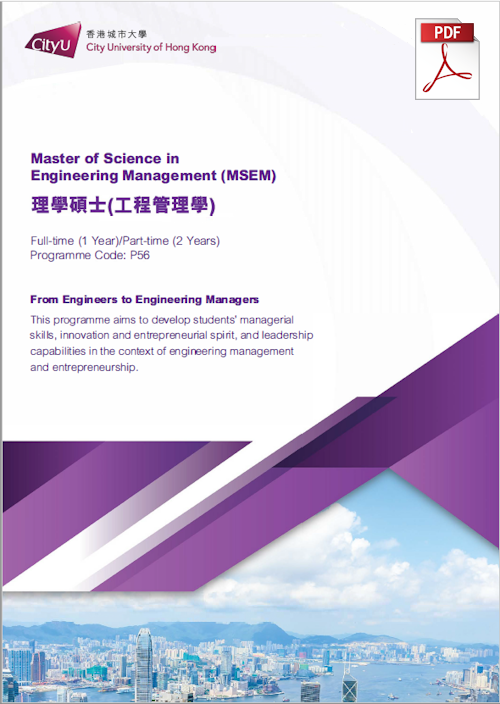Master of Science in Engineering Management
理學碩士(工程管理學)
Programme code: P56
Programme Aims
This Programme aims to equip students with analytical, managerial, and behavioural skills / knowledge in aspect of contemporary engineering management in order to prepare them to meet the educational needs of engineers transiting into practising engineering managers.
Programme Intended Learning Outcomes (PILOs):
Upon successful completion of this Programme, students are expected to:
- reflect on extensive knowledge in engineering management in supporting problem solving, decision making and undertaking projects of discovery and innovation;
- apply managerial skills, including, behavioural and communication skills, needed in the effective transition from the role of an engineer to that of an engineering manager;
- integrate and apply engineering and managerial knowledge in the management of engineering projects, operations, products and services in engineering/manufacturing enterprises and departments;
- be able to generate innovative ideas, to undertake engineering management projects/research and turn the discovery & innovative ideas into practical implementation;
- reflect on responsibility and sensitivity for environmental and societal concerns, inter-cultural issues and global development.
Distinct Features of the Programme
- The programme is highly multi-disciplinary.
- The programme adopts the action learning and team-based experimential learning approaches.
- The programme requires students to work in small groups in different courses to develop solutions for a set of engineering management problems derived from the professional experiences of the students or sponsored by local companies.
Teaching and Learning
The programme utilises a variety of learning methods including :
- Action Learning
- Experimental Learning
- Team-based Learning
- Lectures & Tutorials
- Seminars / Panel Discussions
Programme Structure and Contents
Path of study: You may obtain the MSc degree by either
- completing taught courses only, or
- taught courses plus the dissertation project.
Required Core Courses (12 credit units)
| Course Code | Course Title | Credit Units |
|---|---|---|
| ADSE5006 | Operations Management | 3 |
| ADSE5010 | Engineering Management Principles and Concepts | 3 |
| ADSE6009 | Project Management | 3 |
| ADSE6012 | Technological Innovation and Entrepreneurship | 3 |
Programme Electives (18 credit units)
A minimum of 12 CUs from ADSE is required.
| Course Code | Course Title | Credit Units |
|---|---|---|
| ADSE5009 | Industrial Marketing Management for Engineers | 3 |
| ADSE6014 | Asset and Maintenance Management | 3 |
| ADSE6015 | Supply Chain Management | 3 |
| ADSE6018 | Dissertation | 9 |
| ADSE6037 | Managing Strategic Quality | 3 |
| ADSE6043 | Quality and Reliability Engineering | 3 |
| ADSE6045 | Industrial Case Study | 3 |
| ADSE6047 | Quality Improvement: Systems and Methodologies | 3 |
| ADSE6050 | Engineering Economic Analysis | 3 |
| ADSE6053 | Business Process Improvement and Innovation | 3 |
| ADSE6101 | Estimation and Control of Random Dynamic Systems | 3 |
| ADSE6102 | Managerial Decision-making Systems with Artificial Intelligence | 3 |
| ADSE6103 | Financial Engineering for Engineering Managers | 3 |
| ADSE6105 | Risk and Decision Analysis | 3 |
| ADSE6106 | Intelligent Manufacturing for Engineering Managers | 3 |
| ADSE6107 | Contemporary Occupational Safety and Health Management | 3 |
| ADSE6108 | Energy Conservation and Management | 3 |
| ADSE6109 | Semiconductor Manufacturing and Management | 3 |
| ADSE6110 | Data Analysis and Artificial Intelligence for Systems Engineering | 3 |
| ADSE6111 | Transportation and Logistics Management | 3 |
| ADSE8202 | Systems Modelling and Management | 3 |
| ADSE8204 | Process Modelling and Control | 3 |
| ADSE8205 | Managerial Economics | 3 |
| EE6610 | Queueing Theory with Telecommunications Applications | 3 |
| EE6620 | Linear Systems Theory and Design | 3 |
| MNE6051 | Sustainable Green Manufacturing | 3 |
| MGT5313 | International Organizational Behaviour | 3 |
| MGT6314 | Global Human Resource Management | 3 |
| MGT6325 | International Entrepreneurship & Intrapreneurship | 3 |
| MGT6326 | Managing International Business | 3 |
| MS5217 | Statistical Data Analysis | 3 |
| MS6219 | Predictive Modeling and Forecasting for Business | 3 |
| SDSC6004 | Data Analytics for Smart Cities | 3 |
| SDSC8009 | Data Mining and Knowledge Discovery | 3 |
Remark: These elective courses will be offered subject to the availability of resources.
Total Credit required for the MSc Programme: 30
Student Handbook (PDF)
2023/24
2022/23
2021/22
2020/21
2019/20
(Note: The handbooks are updated as at the beginning of the corresponding academic years.)
Admission Requirements
Applicant must be a degree holder in Engineering, Science or other relevant disciplines, or its equivalent*
* Note
- A graduate member or a non-member who possesses the qualification for graduate membership of a professional institution, e.g., the Hong Kong Institution of Engineers (HKIE), or a member Institution of the Engineering Council (UK), or other recognized professional engineering institutions, or
- Qualifications with evidence of academic and professional attainment acceptable to the University.
Non-local candidates from an institution where the medium of instruction is not English should fulfil one of the following English proficiency requirements:
- a score of 79 (Internet-based test) in the Test of English as a Foreign Language (TOEFL); or
- an overall band score of 6.5 in International English Language Testing System (IELTS); or
- a score of 450 in the new College English Test (CET6) of China mainland or a pass in the old CET6 test; or
- other equivalent qualifications
TOEFL and IELTS scores are considered valid for two years. Applicants are required to provide their English test results obtained within the two years preceding the start of the University's application period.
Applicants are required to arrange with the Educational Testing Service (ETS) to send their TOEFL results directly to the University. The TOEFL institution code for CityU is 3401.
Financial Aids & Scholarship

Fellowship awards are supported by the HKSAR Government for local students admitted to this programme. The fellowship students are required to pay a minimum tuition fee of HK$42,100, which is the prevailing rate of the UGC-funded programmes, and the differences will be subsidised by the fellowships subject to a cap of HK$120,000 (for the whole taught postgraduate programme, regardless of the actual study period) for the settlement of the tuition fee only. Local students admitted to the programme in full-time, part-time or combined study in the 2023/24 academic year will be invited to submit applications for the fellowships.
Entrance Scholarship
A maximum of two MSEM-Entrance Scholarships will be awarded to outstanding student(s) in each academic year. The value of each award shall not exceed HK$25,000 (subject to availability of resources).
Eligible applicants may claim from the Continuing Education Fund (CEF) for a maximum amount of HK$25,000.
The tuition fee level for existing students is fixed in accordance with their year of admission until graduation. For details, please see Continuing Education Fund (CEF) - Application and Reimbursement.
Tuition Fees
HK$6,600 per credit (for local and non-local students admitted in 2023/24)
Total credit units required: 30
Duration of study
| Normal Period | Maximum Period |
| Full-time (1 year) | FT (2.5 years) |
| Part-time (2 years) | PT/combined mode (5 years) |
History of The Programme
The MSEM programme has a long history. It was launched in the late 1980s and was the first MSc programme in Engineering Management in Asia and one of the pioneers in the world. Since its launch, the programme has become one of the most popular programmes in the College of Engineering at CityU. With the success of the MSc programme, the Department launched its BEng Programme in Industrial Engineering and Engineering Management in the mid-1990s and its flagship Engineering Doctorate programme in Engineering Management in 2010.
Uniqueness of The Programme
The uniqueness of the programme as compared with other management programmes lies in the following:
Engineering Management Context
While the management skills are common, the engineering managers manage activities with a strong engineering/technical content. This programme provides the strong engineering management context.
The functions of general and engineering managers are significantly different. General managers are oriented towards business issues. Engineering managers undertake professional functions such as engineering project management, engineering operations planning and control and product / services development. This programme aims to develop a critical understanding of the academic and professional knowledge required to execute these engineering management functions. Empathy
Engineers have special strengths and weaknesses. This programme focuses on the characteristics of engineers as a group. This facilitates the concentration and empathy required for the successful transition from the role of engineers to that of engineering managers. Accreditation by Hong Kong Society of Quality (HKSQ)
The course ADSE6047 "Quality Improvement: Systems and methodologies" has been accredited by the Hong Kong Society for Quality (HKSQ) . Students who successfully completed the course are eligible to apply for registration as Certified Six Sigma Green Belt (HKSQ) .
Contact Us
Programme Leader General EnquiriesEmail: sye.office@cityu.edu.hk
For application enquiries, please contact School of Graduate Studies (SGS) at tpadmit@cityu.edu.hk
For visa matters, please contact Global Engagement Office (GEO) at geoins@cityu.edu.hk
Last modified on 26 February, 2024
